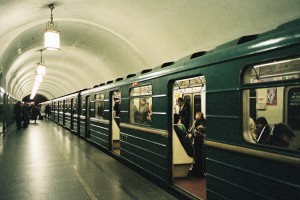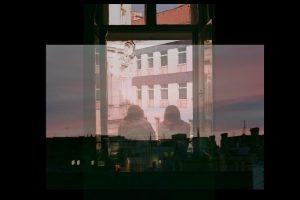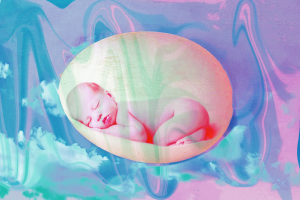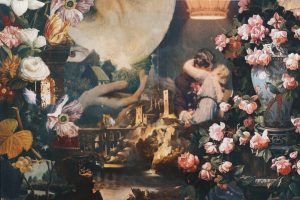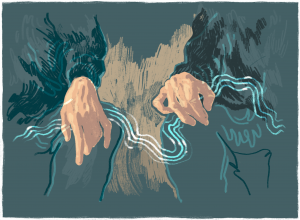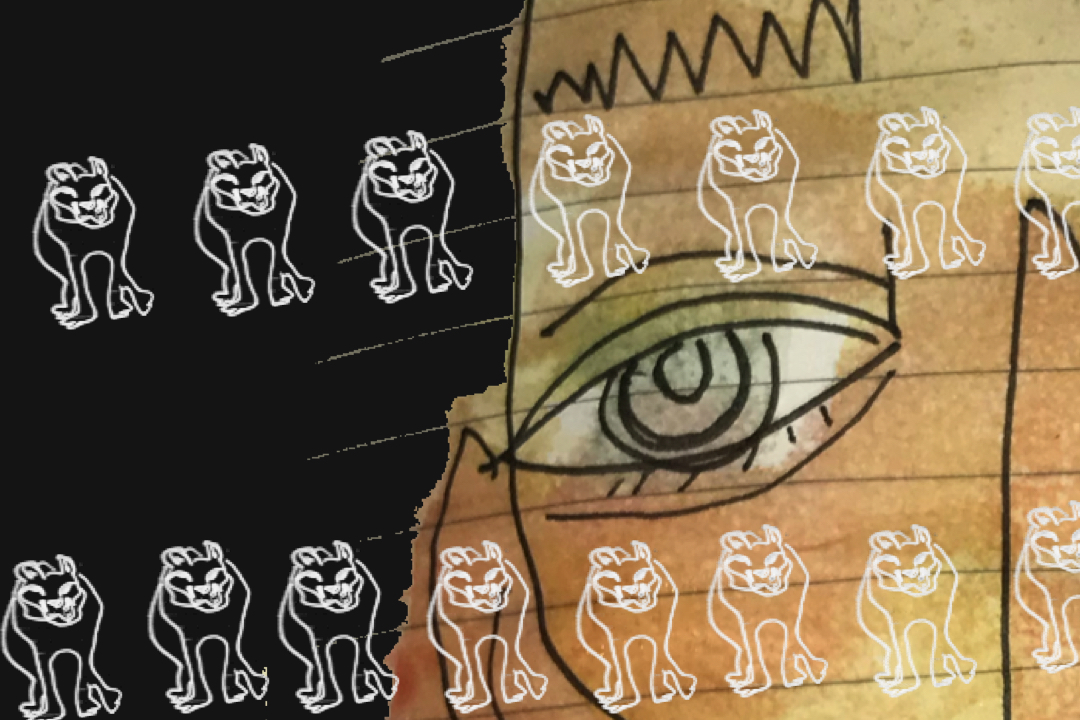
The Lion
by Alex Chasteen | January 19, 2020
The first night my father was gone wasn’t the worst of it but it was bad: the three of us in the big bed, wide awake until dawn. I still remember each long hour. February, and the restless dreamless night stretched on forever, my mother rubbing her freezing feet on us, my brother crawling deep under the covers as if that would make a difference, wriggling to the foot of the bed, to the middle, to upside down, resting his feet under the pillow. Me, stock still on my father’s side, watching the red light of the alarm clock, the only light in the room. We were awake, with nothing to do but be awake, as if we were waiting for something. At five thirty my mother decided it was a human time to be up, so she went downstairs to get the paper and make tea. I was filling the kettle with water when she came back inside.
“Snowed again last night,” she said. “There are fresh mountain lion tracks up there. All around the car.”
“Weren’t they coyote tracks before?” I asked, lighting the stove.
“Probably won’t be too many coyotes around now,” she laughed. “It’s snowing – run up now if you want to see them.”
I did. They were clear cat prints, crisp fossils in the glowing new snow already losing their shape in the fall, unspooling from around her Honda SUV and leading somewhere up the hill along our obscure mountain road.
While I was gone, my mother had lit candles, an endless string of tea lights.
“Make some tea for your brother. He’ll be down in a minute,” she said.
I made her Irish Breakfast, him Peppermint. I made myself medicinal throat tea. I wasn’t sick, just liked the taste. We sat in silence, my mother’s face cast in strange shadows from the vit-amin D lamps that all the stay-at-home moms here have so they don’t want to kill themselves so much. It’s the worst in winter, all her friends said.
When all that was left in her mug was honey, my mother went downstairs. In the computer room, she made phone call after phone call to old friends. PTA chairs, Girl Scout leader friends, friends from college, old bosses. I’d always liked to listen under the door but I’d been doing it more often, and straining harder, since he went to the desert to get better. It had been hard to hear but I caught some things, like the thing about the horses. My father hated horses but the therapists were making him ride them anyways. Said it’d be good for him. My mother could hardly talk about it – she hated horses just as much as he did.
Somewhere behind me, my brother arranged his train set on the floor. I could hear him pushing the toy trains faster and faster.
After a while my mother headed out to shovel the driveway, to get rid of the tracks. But I was waiting to see if it got colder. I wanted to see the creek behind the house freeze solid.
A week and a half later, my mother came into my room while I was doing math homework to tell me she’d seen it. The mountain lion.
She’d been taking rotting vegetables to the compost bin. Because our house was built into a hill, the porch (which extended from the second storey) was far above the forest floor. Underneath we kept everything that rotted: our compost bin, potted plants my mother had killed, lawn chairs left out too long in the rain. She had turned around to go back inside and there it was, across the small creek that ran behind our row of houses down to the lake, a little ways up the mountain. He was stalking away, my mother said, but his shape was unmistakable.
I’d heard stories about the mountain lions that lived in the woods. We all had. When you lived that deep in the forest you saw things.
“It was bizarre,” my mother sighed, settling onto my bed even as I turned back to my work. “The way it moved. Like water. Like it didn’t have bones.”
I waited for her to continue, to give news about my father, maybe even – I almost hoped – to explain what he was doing out there. What had happened when she filed the missing persons report, when he was found, and why he had to go somewhere in Arizona for months. But she just stared up at the ceiling, silent, her legs too long for my little mattress, and eventually fell asleep so that I had to tiptoe out of my own room.
When my mother saw it three more times over the next two weeks, she decided to kill the lion herself. Everyone knew animal control did nothing for those of us this far out and she could handle it. It wasn’t until later that I saw how she intended to kill it.
On the last day of March my mother told me what my dad wanted more than anything was drawings from his two beautiful children. They were done with the horses and he’d been doing other types of therapy that were going quite well and the doctors thought he might be coming back even earlier than expected. “But only if you kids do your part,” my mother said. We crossed our hearts that we would. I stayed up late into the night drawing and redrawing and tracing and copying and throwing it all out, because, even though I was truly a terrible drawer, I couldn’t let him down. I drew over and over and over to get it right. But all I could manage was a horse with a face that looked more like a shoe and creeks whose water didn’t flow at the right angle and dogs with legs all different lengths. I let myself cry silently in the closet behind the coats, slowly crushing the shoe-horse drawing into a smaller and smaller ball. Then I screwed up my face and sat back at the desk to try again and get it right this time.
That night I snuck into the computer room to steal more printer paper. I found my mother sitting cross-legged on the floor, staring out the window at the birches pulling up from the frozen ground in the wind. She was clutching the rifle I’d seen under the big bed when hiding there during hide and seek. As I stood in the doorway, a hulking shape stalked past the window. She jerked back, making a sound from deep in her throat. She started to breathe very fast. I crept back upstairs without any more paper.
I’d been on ferries before where I’d watched orcas’ dorsal fins drift closer and closer until the captain went on the intercom to whisper that they’d slipped under the boat. People below us rolled down their windows, watching from their cars, sticking their necks out, slack-jawed. As I slipped up the stairs, I could feel it: something moving under the stairs. Something huge, smooth, with great big teeth, here just for me.
It didn’t snow that year; the creek kept running wet. In April I spent hours looking out my window into the woods, searching for the lion. There had been a drought that year and my teacher taught me that droughts drew the animals closer, to hunt for the food they needed. I’d seen the lion’s prints but I couldn’t picture it properly. When I tried to imagine its eyes I pictured my father’s. When I tried to imagine its gait, I pictured how my father might look in a mountain lion suit, ambling on all fours, a little silly, a little self-conscious, knocking over a birch, crushing salamanders under his oversized paws. In my dreams, the lion crept into my room at night, walking on all fours, and kissed me goodnight. I pretended to sleep but I knew it was him in that suit, and I began to get angry that he was running around eating fish from the lake and small mammals right in front of us, as if we couldn’t tell that it was him in a lion costume.
In May, school ended. I’d been picturing my father’s homecoming for so long that I didn’t know what to think when he walked through the front door. We hugged him tight, slapping our limbs against him when he tried to release us, as though if we pretended hard enough we could become those little spurs on forest trails, caught in your socks and there forever.
Standing in our hallway, he was almost the same as I remembered him, except for a few things: strange scars on his arms, long and uneven, traced topographical around his veins. When I asked, my mother said he’d hurt himself on a broken wine bottle. He was thinner and the lines in his face were gouged deeper. When I first got a good look at him I thought of the table at the children’s museum with a glass-cased model of the Cascade mountains, where every hundred feet is marked by a thin green line on the peaks, and where you can press a button and watch the whole thing flood.
The first thing he wanted to do was go down to the lake, just sit on a blanket on the grass and watch us splash around. I felt weird playing out in the water where he was just a blur, but I indulged him. I jumped off the old log into the lake for him.
We climbed back up the hill and, as the house emerged out of the trees, we could tell that something was wrong. Too much movement. As we drew closer, we could see it clearly: the lean mountain lion, ribs exposed, pacing under our deck, where the lawn chairs had been knocked askew.
My mother started hollering, pulling us to her, waving her arms wide like you’re sup-posed to, but the lion was uninterested.
“Scream,” she said. “Like your lives depend on it.” And she raced into the house through the basement door.
The three of us backed up, my father yelling meaningless sounds – huah, yii, ga-ah – as he inched us back into the trail. We scrambled down into the small canyon of creek bed where there was nothing but water. My father tucked us into the crumbling rock walls and some fell in my mouth. He could see out but all we could see was sandstone.
My brother kept asking me, where’s Momma, what’s she doing, is she okay, is the mountain lion gone, is it gone, is it gone, is she coming back now. I whispered nonsense words to him but I was staring up. How predatory my father’s new face looked, I thought, staring at the house like that. And look how he shifts from foot to foot, like he wants to prowl. When he glanced down at us I realised what an unnatural shine his eyes had, and I was suddenly very afraid for my mother.
My brother was in the middle of asking if a mountain lion was the same thing as a cougar when we heard what sounded like a gunshot, only impossibly loud.
My mother cooked that night, a big elaborate meal. Tagliatelle from scratch, using the old pasta press my father had brought from Italy. Sauce with tomatoes and peppers, caramelised onions and mushrooms and sausage, entire unchopped cloves of garlic. Bruschetta, prosciutto, burrata. Bottles of sparkling water, and two flavours of gelato for dessert. I helped her set the table in silence, testing out the words and realising I could never tell her, never explain, that the thing she’d really shot behind our house was not a lion at all.
Later the conversation came smoothly, and we shouted and laughed and my brother rolled a toy train along the edge of his placemat. But before that, we served ourselves in silence, so quietly we could feel the table tremble, so quietly we could hear the cold wind buffeting the slim paper birches side to side. Even as we moved our forks and knives, the windows shuddering in their frames, my brother rolling the toy wheels faster and faster with his finger, everything felt perfectly still.∎
Words by Alex Chasteen. Art by Chloe Dootson-Graube.
